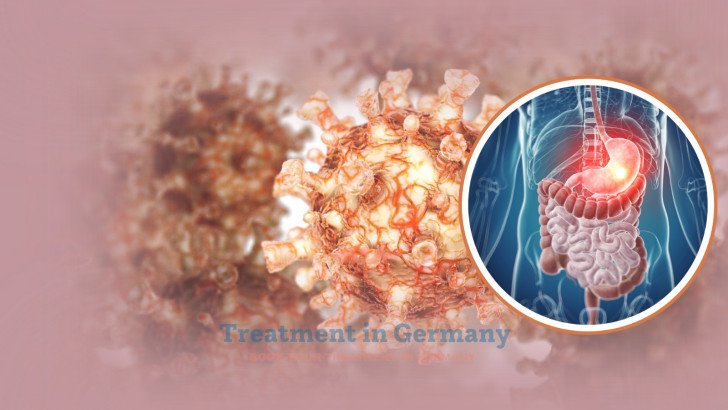
Stage 4 stomach cancer, or metastatic gastric cancer, occurs when cancer cells spread beyond the stomach to distant organs such as the liver, lungs, or peritoneum, making treatment more complex
Stage 4 stomach cancer, also known as metastatic gastric cancer, remains a challenging diagnosis, with cancer spreading to distant organs like the liver, lungs, or peritoneum. However, dendritic cell therapy, a cutting-edge immunotherapy, offers hope by harnessing the immune system to fight cancer. This therapy is transforming cancer treatment in Germany. German cancer clinics, led by experts like Prof. Frank Gansauge with over 20 years of experience, provide dendritic cell therapy for stomach cancer, including HER2 positive stomach cancer treatment options, to improve survival rate of stage 4 stomach cancer and quality of life.
Stage 4 stomach cancer, or metastatic gastric cancer, occurs when cancer cells spread beyond the stomach to distant organs such as the liver, lungs, or peritoneum, making treatment more complex. Among these cases, approximately 15–20% involve HER2-positive gastric cancer, where tumors overexpress the HER2 (human epidermal growth factor receptor 2) protein.
These patients often respond to targeted therapies like trastuzumab. However, resistance frequently develops, leading to refractory disease. In such advanced or treatment-resistant cases, dendritic cell therapy offers a promising, individualized immunotherapy approach by enhancing the body’s immune recognition and destruction of cancer cells, potentially improving outcomes even in HER2-positive subtypes.
Symptoms of advanced stomach cancer include:
Severe abdominal pain or bloating
Unexplained weight loss
Nausea, vomiting, or difficulty swallowing
Blood in stool or vomit
Fatigue, anemia, or jaundice (liver metastases)
Why Stage 4 Stomach Cancer Requires New Solutions
Stage 4 stomach cancer is defined by metastasis, where cancer has spread beyond the stomach to other parts of the body. At this stage, curative surgery is usually no longer possible. Even targeted therapies, such as trastuzumab for HER2-positive gastric cancer, can lead to resistance or offer limited improvement in survival. This has created an urgent need for alternative therapies that are more durable and personalized.
Dendritic cell therapy rises to meet this challenge, particularly for patients with treatment-resistant tumors or those who seek gentler alternatives to traditional chemotherapy.
What Is Dendritic Cell Therapy?
Dendritic cells are a type of immune cell responsible for identifying foreign substances and triggering a T-cell response. In cancer patients, however, these cells often fail to detect tumor antigens. Dendritic cell therapy solves this problem by training these cells in a laboratory to recognize specific cancer antigens
How It Works:
Extraction: Dendritic cells are collected from the patient’s blood.
Education in the Lab: In specialized GMP-certified labs, these cells are exposed to cancer-specific antigens which are often derived from tumor tissue or liquid biopsy markers.
Reinfusion: The trained dendritic cells are then reintroduced into the patient’s bloodstream to activate a targeted immune response, especially by cytotoxic T-lymphocytes (CTLs).
This process helps the immune system identify and attack cancer cells more effectively.
Leading Specialist Prof. Frank Gansauge: Advancing Dendritic Cell Therapy for Cancer Care
Ongoing clinical trials and research in immunotherapy continue to enhance our understanding and application of innovative treatments. Among the leading figures in this field is Prof. Frank Gansauge, a pioneer in dendritic cell therapy, who has dedicated over 20 years to developing and refining this method. This therapy costs around 24,000€.
Family Risk Factors for HER2-Positive Stomach Cancer
Risk factors include:
Genetic Factors: HER2 gene amplification or family history of gastric/breast cancer.
Lifestyle Factors: Smoking, alcohol, high-salt diets.
Infections: Helicobacter pylori
Age and Gender: Higher risk in men over 60.
Diagnosing Stage 4 Stomach Cancer
Accurate diagnosis is crucial for tailoring dendritic cell therapy for stomach cancer. German cancer clinics use advanced tools to confirm stage 4 disease and HER2 status.
Diagnostic Approaches
Endoscopy and Biopsy: Confirms HER2 status via immunohistochemistry (IHC) or fluorescence in situ hybridization (FISH).
Imaging: CT, MRI, or PET scans detect metastases.
Liquid Biopsy: Identifies tumor markers for dendritic cell therapy
Genetic Testing: Assesses biomarkers for stomach cancer.
🌍Why Patients Worldwide Prefer Our Medical Services in Germany – Key Benefits Explained:
Frequently Asked Questions (FAQs)
What is dendritic cell therapy for stage 4 stomach cancer?
It’s a personalized immunotherapy using trained dendritic cells to target cancer.
How effective is dendritic cell therapy?
Dendritic cell therapy can help patients with stage 4 stomach cancer live around 18 to 20 months on average after beginning the treatment.
What are HER2 positive stomach cancer treatment options?
Trastuzumab, pembrolizumab, and dendritic cell therapy are key options.
What are symptoms of advanced stomach cancer?
Pain, weight loss, nausea, and fatigue, often due to metastases.
What are HER2 positive gastric cancer long-term side effects?
Cardiac issues, lung issues, fatigue, and low blood count.
How can I access treatment in Germany?
Contact us today for a free consultation with our specialist medical advisor and receive direct guidance from the treating professor on the most suitable treatment options available in Germany.
Kindly complete the form below, and our dedicated team will reach out to you promptly. We look forward to connecting with you soon!
Trierer Straße, 56072 Koblenz, Germany

.webp)
 (1).webp)

.webp)
 (1).webp)


.webp)
 (1).webp)

.webp)
 (1).webp)
